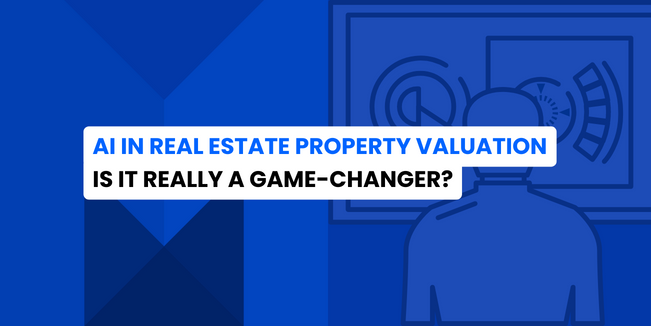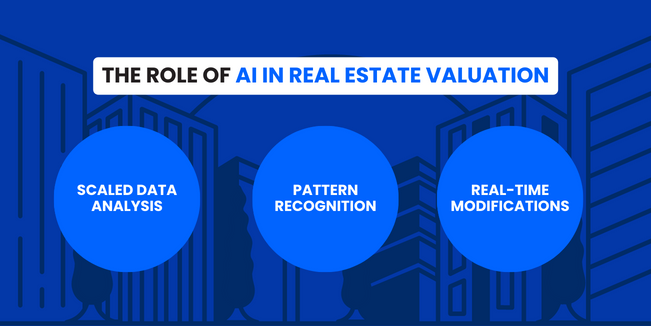ai
real estate app development
realestateapps
augumentedreality
AI in real estate property valuation: Is it really a game-changer?

The process of real estate valuation has long played a crucial role in determining successful transactions for both buyers and sellers. These valuations have historically relied mainly on manual analysis and subjective assessments, which frequently resulted in errors and delays.
However, the introduction of artificial intelligence (AI) has ushered in a period of change. It altered the way properties are evaluated and opened the door for previously unheard-of levels of accuracy, efficiency, and transparency. There is no longer any need to rely entirely on the judgment of human appraisers, who frequently had to sort through enormous amounts of data and complicated criteria when determining property prices.
The paradigm shift of AI in real estate valuation methods
Consider AI as an experienced investigator scouring a wide range of data sources, including records of property transactions, tax assessments, comparable properties, and regional market patterns. AI adds a new dimension to property appraisal through data-driven detective work, delivering insights fair market value that go beyond the boundaries of traditional methodologies. The secret is AI's ability to identify subtle correlations and trends in data, giving it the ability to deliver a more thorough and precise evaluation of a property's value.
The multidimensional significance of AI in property assessment will be revealed as you read further in this article. We'll examine how its data analytic capability, pattern recognition skills, and real-time flexibility combine to change the valuation landscape. We'll also explore the numerous advantages that AI-driven property appraisal offers to stakeholders, from unmatched precision to increased time and cost efficiency. We'll also explore the practical uses of AI-powered valuation, seeing first-hand how it's reshaping everything from mortgage lending to investment analysis, property tax assessment, and even real estate management.
The role of AI in real estate valuation

Property valuation is a difficult jigsaw with many different pieces that together define the value of a particular piece of real estate. These elements include the waxing and waning market trends, the property attributes that make it special, the attraction of the location, and the transactional history of subject property. The difficult process of putting these pieces together into a cohesive value was formerly carried out by human appraisers, who frequently struggled with the enormous amount of data and the complex patterns woven within it.
Scaled data analysis
AI algorithms act as virtual data miners, efficiently sifting through a wide variety of data sources. These sources include tax assessments, comparable property data, sales records, and the ever-changing local market trends. This vast amount of data is not only analyzed faster than humanly possible, but it is also turned into useful insights that serve as the foundation for AI-driven appraisals. AI enables a more comprehensive and data-driven approach by sorting through this plethora of information, making sure that no information is overlooked in the pursuit of accuracy.
Pattern recognition
The data's complex details are AI's playground; the technology's ability to recognize patterns gives life to hidden connections and trends that might be imperceptible to the human eye. Think of it as a clever detective, piecing together the disparate clues in the data to create a coherent story. AI improves its valuation method by seeing trends that may cross multiple dimensions, leading to a more thorough and detailed knowledge of a property value. This mastery of pattern recognition gives the appraisal process a level of precision and understanding that conventional methods could only hope to approach.
Real-time modifications
The dynamic of real estate markets necessitates the capacity for real-time adaptation, which AI expertly pulls off. Traditional valuation methods frequently rely on out-of-date data and are unable to take into account market changes that happen quickly. On the other hand, AI, which is able to smoothly incorporate real-time changes, thrives in this swift current.
As a result, the values it offers are not only grounded in history but also reflect the present, helping stakeholders better understand the constantly changing environment. Real-time adaptation, which distinguishes AI from traditional approaches and emphasizes its applicability in an increasingly fast-paced market, is a hallmark of AI's revolutionary power.
AI redefining real estate assessment
As we go more into AI's involvement in residential real estate assessment, it becomes clear that its skill in data analysis, pattern identification, and real-time responsiveness represent a paradigm shift in a sector that has long been dependent on manual methods. The seamless fusion of technology and valuation knowledge ushers in a new era when accuracy and insight rule supreme, boosting property assessment to previously unheard-of levels of relevance and accuracy.
AI-driven property valuation advantages
The application of AI to property appraisal unleashes a disruptive wave of benefits that appeals to real estate stakeholders from all angles. Modern technology and valuation knowledge combined to revolutionize the entire nature of property evaluation and bring in a new era of precision, efficiency, and transparency investment property itself.
Improved accuracy
The potential of artificial intelligence to remove the specters of subjectivity and bias that have long plagued conventional methodologies is one of the most persuasive advantages it bestows upon property assessment. AI algorithms work in the world of unadulterated facts, free from the influence of subjective opinions or emotional tendencies.
This objectivity guarantees that assessments are based on data-driven insights, leading to evaluations that are amazingly accurate representations of the market's actual worth. AI redefines accuracy in property assessment by piercing the cloud of subjective judgment and giving stakeholders confidence that the value allocated to a property is a true reflection of its fair market status.
Efficiency in time
In the context of property valuation, time, which is frequently a valuable and elusive resource, assumes a different dimension. Traditional procedures that required days or even weeks for a thorough valuation have been outperformed by AI-driven processes in terms of efficiency. The time needed for valuations is significantly decreased by the unmatched speed at which AI systems evaluate and understand data.
What used to take days to encompass extended waiting times now takes just a few hours. This improved efficiency not only speeds up transactions but also adds some adaptability to the valuation process, allowing players to respond quickly to changing market conditions.
Cost reduction
The effectiveness of AI also has an impact on its financial component in property appraisal. Traditional approaches frequently require several appraisals and re-evaluations to improve accuracy, which could result in significant costs being incurred. AI steps in as a cost-effective savior, easing the procedure of appraisal.
AI reduces the need for repeated evaluations by efficiently finding trends from a variety of data sources and synthesizing them. The outcome? a substantial decrease in expenditures for both buyers and sellers, reallocating funds to more fruitful pursuits during the real estate process.
Clear insights
The enlightening openness of AI-driven assessments dispels the obscurity that periodically cloaked conventional valuation techniques. The algorithms used in AI-driven appraisal are not opaque black boxes; instead, they offer concise justifications for their findings. Stakeholders are given a thorough explanation of each valuation's methodology.
This openness encourages faith in the procedure and promotes reasoned decision-making. The clarity offered by AI insights is a great asset, whether you're a buyer looking for a home or an investor hoping to maximize returns.
Improved investment choices
The empirical basis for AI-driven valuations gives stakeholders a strong tool for improving their investment choices. The insights gained through data-backed valuations can be used by investors, purchasers, and sellers to make wise decisions. The accuracy of AI-driven appraisals helps reduce risks when determining a property's prospective returns or analyzing market trends to make strategic choices. A precaution against overpaying or underselling is provided by this data-driven decision-making, which eventually results in more successful and informed outcomes.
Real-world applications of AI-driven property valuation

As the digital age threads its intricate patterns into the fabric of the real estate market, practical applications of AI-driven property valuation emerge as beacons of innovation and efficiency. This section focuses on the concrete ways in which AI is already transforming real estate activities, such as mortgage lending, real estate investment, research, property tax assessment, and portfolio management.
Mortgage lending: using AI to speed up approvals
AI is clearly present in the mortgage lending industry, where accuracy and speed are crucial. Long wait times for loan approvals might result from the traditional method of determining collateral value and assessing loan risks. To provide precise and fact-based property values, AI-equipped algorithms quickly examine large datasets, closely examining property attributes and market patterns. In addition to speeding up mortgage approvals, this faster process guarantees that lenders make educated decisions, lowering the risks associated with incorrect values.
Unveiling insights with AI-powered valuations for investment analysis
Investors in real estate are accustomed to the difficulty of estimating future profits and determining market trends. In this area, AI proves to be a beneficial ally, giving investors a wide range of analytical tools. Deep analysis of historical and present market data by AI-powered appraisals reveals hidden correlations and trends that might escape detection by more conventional techniques. With these data at their disposal, real estate investors can choose properties that complement their investing strategy and increase their chances of making money.
Property tax assessment: using AI to ensure fairness and accuracy
The problem for local governments in charge of property tax assessments is to make sure that values are reasonable, consistent, and market-based. AI-driven property appraisal enters the picture as a way to accomplish these goals with astounding accuracy. AI creates property values that are free of human prejudice and inaccuracy by evaluating enormous volumes of data and spotting intricate patterns. This objectivity promotes community benefit by less property taxes, increasing tax distribution equity and building trust between governments and property owners.
Portfolio management: using AI to improve real estate portfolios
The analytical prowess of AI offers a game-changing possibility for people in charge of managing real estate holdings. Real estate assets include a diverse range of buildings, each impacted by particular elements that affect their worth. AI serves as a potent tool for portfolio optimization, monitoring real estate values, spotting new trends, and directing strategic choices. Portfolio managers may fine-tune their holdings using AI to highlight assets with growth potential and provide real-time insights, maximizing returns and lowering risks.
Forging ahead with AI in the real estate market value

In essence, AI-driven property value is proof that human expertise and technical prowess can coexist. Complexities have been clarified, barriers have been broken, and property appraisal has been freed from the restrictions of manual procedures. The efficiency it offers drives transactions at a pace previously thought to be unachievable, while the precision it imparts to appraisals eliminates subjective biases. Additionally, the transparency it delivers eliminates obscurity, increasing understanding and trust among all parties involved.
The message is clear: adopting AI-driven real estate valuation is not just a choice, but a strategic step toward a future of real estate investing defined by informed decisions and successful outcomes. This message is for every buyer seeking their ideal home, every seller aiming for the best returns, every investor seeking to maximize their portfolio, and every industry professional striving for excellence. The real estate market of the future is at hand, and AI is the conduit that carries us there, where precision, effectiveness, and transparency redefine what it means to determine a property value.